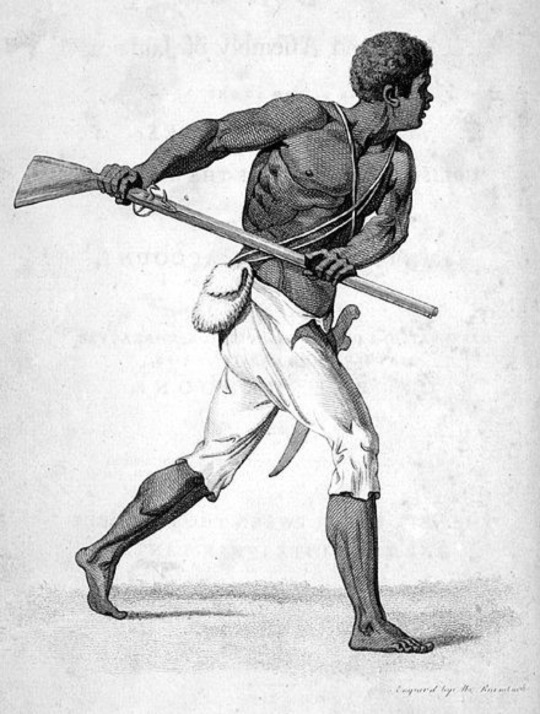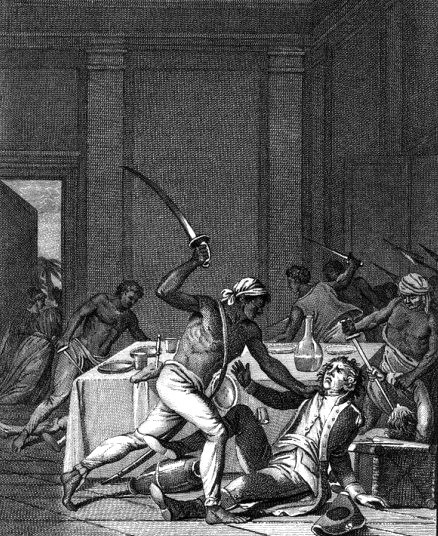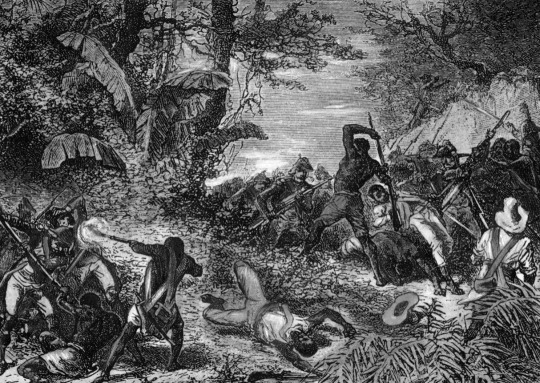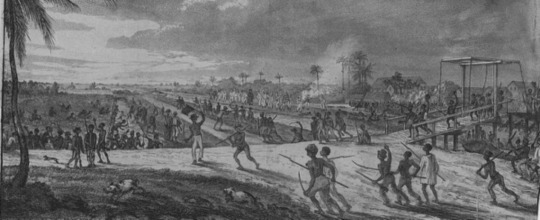#Berbice Slave Revolt
Explore tagged Tumblr posts
Text

The 1763 Berbice Slave Revolt was a rebellion that took place in the Dutch colony of Berbice, which is now part of Guyana:
Who led the revolt: The revolt was led by Cuffy, a Coromantin man who was enslaved and trafficked from West Africa, and his deputy Akra.
When did it happen: The revolt began on February 27, 1763 and lasted until 1764.
What happened: The rebels set fire to plantations, killed Europeans, and took over food stores and households. The rebels gained control of the colony until the Dutch army arrived.
What was the outcome: The Dutch regained the colony and executed 125 men and 3 women.

What caused the revolt: The revolt was caused by extreme labor conditions, tropical diseases, food shortages, and planter brutality.
What was the impact: The revolt had a significant impact in the Dutch Republic, where it was widely reported in the press. It also foreshadowed later insurrections, such as the Haitian slave rebellion.
What is the legacy: The anniversary of the revolt, February 23, is Republic Day in Guyana, and Cuffy is a national hero.

#african#afrakan#kemetic dreams#africans#brown skin#afrakans#african culture#brownskin#slave revolt#slavery#Berbice Slave Revolt#cuffy#Dutch colony of Berbice#Guyana#Coromantin#Akra#West Africa#Haitian slave rebellion
15 notes
·
View notes
Text




List of notable slave revolts in the Caribbean during the Transatlantic/European Slave Trade. These Slave revolts emphasise the collective struggle for liberation,
unity, and self-determination:
1. The 1638 St. Kitts Slave Revolt: Enslaved Africans resisted early attempts by European colonizers to dominate the island. This uprising showed that from the very beginning, Africans refused to accept their dehumanization and fought to retain their dignity.
2. Barbados Revolt of 1649: Africans in Barbados challenged the plantation system, laying the foundation for future resistance. This revolt demonstrated the shared struggle of African people across different colonies.
3. The 1675 Curaçao Revolt: Enslaved Africans, many of whom were from the Akan and other warrior societies in West Africa, plotted to overthrow the Dutch colonists. This revolt highlighted the persistence of African resistance traditions, even in exile.
4. Tacky’s War (1760, Jamaica) :Led by Akan warriors like Tacky, this revolt was deeply rooted in African military traditions. It was a call for liberation and unity, showcasing the resilience of African cultures under enslavement.
5. Berbice Slave Rebellion (1763, Guyana): Under Cuffy (Kofi), enslaved Africans controlled parts of Berbice for over a year. This Pan-African hero envisioned an independent African-led society in the Americas, directly challenging European colonialism.
6. Coromantee Wars (1765–1766, Jamaica): Enslaved Akan Africans led revolts against British plantation owners. The unity of African warriors in organizing these rebellions demonstrated the spirit of Pan-Africanism.
7. 1773 Grenada Revolt: Africans resisted their French and British oppressors, reflecting a Pan-African vision of collective liberation and defiance against European exploitation.
8. The First Maroon War (1728–1740, Jamaica): Maroons, descendants of escaped Africans, fought the British for autonomy. Their victory in establishing independent territories was a significant Pan-African triumph.
9. Haitian Revolution (1791–1804, Saint-Domingue): The most powerful expression of Pan-Africanism in the Caribbean, this revolution united enslaved Africans and free people of color. Leaders like Toussaint Louverture, Jean-Jacques Dessalines, and others overthrew French rule, ending slavery and creating the first Black republic.
10. Bussa’s Rebellion (1816, Barbados): Bussa, inspired by the African tradition of communal resistance, led this uprising against British slavery. It echoed Garveyite ideals of self-determination before their time.
11. Demerara Rebellion (1823, Guyana): Led by Jack Gladstone and Quamina, this revolt sought freedom for Africans in British Guiana. It reflected a broader Pan-African consciousness and the demand for dignity and justice.
12. Baptist War (1831–1832, Jamaica): Also known as the Christmas Rebellion, it was led by Samuel Sharpe, who united enslaved people under the banner of Christian and African liberation. This revolt hastened the abolition of slavery in the British Empire.
13. The Second Maroon War (1795–1796, Jamaica): Maroons resisted British incursions into their autonomy, preserving their African-rooted systems of governance and solidarity.
14. 1837 St. Lucia Revolt: Enslaved Africans rose up against British oppression. Their resistance embodied Pan-African ideals, rejecting the colonial domination of their homeland.
15. Trinidad Slave Revolt (1838): Enslaved Africans on the brink of emancipation staged a revolt, demonstrating their refusal to accept anything less than complete freedom.
16. 1733 St. John Slave Revolt (Virgin Islands): Enslaved Africans, many of whom were Akan, took control of the Danish colony for several months. Their strategic unity reflected a Pan-African ethos.
17. Leeward Maroon Wars (1730s–1740s, Antigua and Jamaica): These wars involved guerrilla tactics by escaped Africans who maintained cultural and spiritual links to their homelands.
18. Martinique Revolt (1833): Enslaved Africans rose up against French rule, signalling the unity of Black people against colonial oppressors across linguistic and cultural divides.
19. Santo Domingo Resistance (1795, Dominican Republic): Inspired by the Haitian Revolution, enslaved Africans rebelled, resisting both Spanish and French colonial systems.
#black people#black#black history#black tumblr#blacktumblr#pan africanism#black conscious#africa#black power#black empowering#slave revolts#Slave Rebellion#trans atlantic slave trade#african history#black culture#african culture#black community#caribbean history#afro caribbean culture#black liberation#black freedom#uprising#black revolution
204 notes
·
View notes
Text
Events 2.23 (before 1940)
303 – Roman emperor Diocletian orders the destruction of the Christian church in Nicomedia, beginning eight years of Diocletianic Persecution. 532 – Byzantine emperor Justinian I lays the foundation stone of a new Orthodox Christian basilica in Constantinople – the Hagia Sophia. 628 – Khosrow II, last Sasanian shah of Iran, is overthrown. 705 – Empress Wu Zetian abdicates the throne, restoring the Tang dynasty. 1455 – Traditionally the date of publication of the Gutenberg Bible, the first Western book printed with movable type. 1763 – Berbice slave uprising in Guyana: The first major slave revolt in South America. 1778 – American Revolutionary War: Baron von Steuben arrives at Valley Forge, Pennsylvania, to help train the Continental Army. 1820 – Cato Street Conspiracy: A plot to murder all the British cabinet ministers is exposed and the conspirators arrested. 1836 – Texas Revolution: The Siege of the Alamo (prelude to the Battle of the Alamo) begins in San Antonio, Texas. 1847 – Mexican–American War: Battle of Buena Vista: In Mexico, American troops under future president General Zachary Taylor defeat Mexican General Antonio López de Santa Anna. 1854 – The official independence of the Orange Free State, South Africa is declared. 1861 – President-elect Abraham Lincoln arrives secretly in Washington, D.C., after the thwarting of an alleged assassination plot in Baltimore, Maryland. 1870 – Reconstruction Era: Post-U.S. Civil War military control of Mississippi ends and it is readmitted to the Union. 1883 – Alabama becomes the first U.S. state to enact an anti-trust law. 1885 – Sino-French War: French Army gains an important victory in the Battle of Đồng Đăng in the Tonkin region of Vietnam. 1886 – Charles Martin Hall produced the first samples of aluminium from the electrolysis of aluminium oxide, after several years of intensive work. He was assisted in this project by his older sister, Julia Brainerd Hall. 1887 – The French Riviera is hit by a large earthquake, killing around 2,000. 1898 – Émile Zola is imprisoned in France after writing J'Accuse…!, a letter accusing the French government of antisemitism and wrongfully imprisoning Captain Alfred Dreyfus. 1900 – Second Boer War: During the Battle of the Tugela Heights, the first British attempt to take Hart's Hill fails. 1903 – Cuba leases Guantánamo Bay to the United States "in perpetuity". 1905 – Chicago attorney Paul Harris and three other businessmen meet for lunch to form the Rotary Club, the world's first service club. 1909 – The AEA Silver Dart makes the first powered flight in Canada and the British Empire. 1917 – First demonstrations in Saint Petersburg, Russia. The beginning of the February Revolution (March 8 in the Gregorian calendar). 1927 – U.S. President Calvin Coolidge signs a bill by Congress establishing the Federal Radio Commission (later replaced by the Federal Communications Commission) which was to regulate the use of radio frequencies in the United States. 1927 – German theoretical physicist Werner Heisenberg writes a letter to fellow physicist Wolfgang Pauli, in which he describes his uncertainty principle for the first time. 1934 – Leopold III becomes King of Belgium.
0 notes
Video
youtube
Documentary about the Guyanese slave revolt of 1763 and its leader Cuffy who would go on to become the national hero of modern day Guyana.
#Berbice slave revolt#Guyana#black history#Dutch slavery#Slave revolt#Berbice#Guyanese history#documentary#Cuffy#Akan people#West indies#caribbean#south america#Black#Black strength#black power#Black history month
1 note
·
View note
Photo

“Cuffy Dollar” from Guyana dated to 1970 on display at the International Slavery Museum in Liverpool
This one dollar coin is inscribed with “Berbice Revolt, Febuary 23, 1763, Cuffy” and was put into circulation in 1970 to commemorate Guyana becoming a Republic and to acknowledge the Berbice Slave Rebellion of 1763 led by Cuffy against the Dutch Republic.
Photographs taken by myself 2019
#art#history#guyana#guyanese#slave trade#20th century#coinage#berbice slave rebellion#international slavery museum#liverpool#barbucomedie
13 notes
·
View notes
Text
Facts about the Atlantic Slave trade
1. Despite the fact that it is mainly the stories of American slaves that are taught in schools, most slaves were brought to the Caribbean and South America and in these regions there were hundreds of revolts, some successful, some suppressed.
2. During the period of the Atlantic slave trade there were numerous revolts, yet slavery still continued to go on. Here’s a list of North American Slave revolts.
- 1526 - San Miguel de Guadalupe
Spanish Florida, now Sapelo Island
- 1570 Gaspar Yanga’s Revolt
Veracruz, New Spain ( New Spain included not only Canada, USA, and Mexico, but also the Bahamas, Belize, Cayman Islands, Costa Rica, Cuba, Dominican Republic, El Salvador, Micronesia, Guatemala , Haiti, Honduras, Jamaica, Marshall Islands, Nicaragua, Palau, Philippines, Taiwan, Trinidad and Tobago, and Venezuela).
- 1712 New York Slave Revolt.
- 1730 First Maroon War (British Jamaica)
- 1733 St. John Slave Revolt
- 1739 Stono Rebliion
- 1741 New York Conspiracy
- 1760 - Tacky’s War (British Jamaica)
- 1787 Abaco Slave Revolt (British Bahamas)
- 1791 Mina Conspiracy
- 1795 Pointe Coupeé Conspiracy
- 1791 - 1804 Haitian Revolution (French Saint Domingue)
- 1800 Gabriel’s Rebellion
- 1803 Igbo Landing (St. Simons Island, Georgia)
- 1805 Chatham Manor (Virginia)
- 1811 German Coast Uprising (Territory of Orleans)
- Bussa’s Rebellion (British Barbados)
- 1822 Denmark Vesey (South Carolina)
- 1831 Nat Turner’s rebellion
- 1831 - 1832 Baptist War (British Jamaica)
- 1839 Amistad, Ship rebellion (off the Cuban coast)
- 1841 Creole case, ship rebellion
- 1842 Slave Revolt in the Cherokee Nation (Indian territory)
- 1859 John Brown’s Raid. (Virginia)
Look at all these slave revolts, and these revolts only happened in North America. The Bayano Wards, Berbice Slave uprising, the Curaçao Slave revolt of 1795 and the Demerara rebellion of 1823. There are 485 recorded instances of slaves revolting on board slave ships.
Marcos Xiorro Planned to lead a slave revolt in Puerto Rico.
The Bahia Rebellion and Malê Revolt happened in Brazil.
There were slave rebellions everywhere. Tacky’s war, a slave uprising in Jamaica was put down by the British Colonial government. There were successful cases of slave revolts for example the Haitian Revolution and the Danish West Indies.
Despite various slave revolts, slavery still carried on. The actual buying of slaves from Africa ended for Britain in 1807, yet in Jamaica slavery carried on until 1834 and during the end and after the Atlantic Slave trade to the Caribbean and South America, the colonies brought over indentured servants, hence why the Caribbean and South America is such a melting pot of people who have lived there for generations. Slavery carried on even after hundreds of rebellions. Surely if Slavery was a choice all slavery rebellions/escapes would have resulted in the end of slavery at an earlier date, better yet if slavery was a choice revolts wouldn’t even need to happen.
And what about modern day slavery, Kanye.... do the victims of modern day slavery and human trafficking choose to be victims ?
#kanye west#if slavery was a choice#Caribbean slavery#American slavery#South American slavery#Modern day slavery#indentured servitude#india#china#africa#ghana#Puerto Rico#Cuba#Jamaica#Bahamas#Barbados#Brasil#Venezuela#haitian revolution#Guyana
598 notes
·
View notes
Text
Berbice Slave Uprising, Project Loon, LowKey, More: Friday Afternoon ResearchBuzz, January 22, 2021
Berbice Slave Uprising, Project Loon, LowKey, More: Friday Afternoon ResearchBuzz, January 22, 2021
NEW RESOURCES The Guardian: Dutch exhibition offers new insight into Berbice slave uprising. “The Dutch national archives are showcasing a unique set of letters sent by the leader of the first organised slave revolt on the American continent to a colonial governor, in which the newly free man proposed to share the land. The offer from the man known as Cuffy, from Kofi – meaning ‘born on Friday’ –…
View On WordPress
0 notes
Text
0 notes
Photo

Guyana "Coffy, or Kofi or Koffi, (died in 1763), was an Akan man who was captured in his native West Africa and stolen for slavery to work in the plantations of the Dutch colony of Berbice in present-day Guyana. He became famous because in 1763 he led a revolt of more than 2,500 slaves against the colony regime. Today, he is a national hero in Guyana " Source from Wikipedia His status/ monument stands in Durban Park guyana Photography by @frmoorephotography #guyana #coffy #cuffy #westafrican #caribbean #guyanese #african #afrocaribbean #goldenarrowhead #guyanaflag #blackman #revolt #fighters #hero
#guyanese#afrocaribbean#guyanaflag#coffy#guyana#westafrican#caribbean#blackman#revolt#cuffy#fighters#goldenarrowhead#hero#african
1 note
·
View note
Text
Events 2.23
303 – Roman emperor Diocletian orders the destruction of the Christian church in Nicomedia, beginning eight years of Diocletianic Persecution. 532 – Byzantine emperor Justinian I lays the foundation stone of a new Orthodox Christian basilica in Constantinople – the Hagia Sophia. 628 – Khosrow II, last Sasanian shah of Iran, is overthrown. 705 – Empress Wu Zetian abdicates the throne, restoring the Tang dynasty. 1455 – Traditionally the date of publication of the Gutenberg Bible, the first Western book printed with movable type. 1763 – Berbice slave uprising in Guyana: The first major slave revolt in South America. 1778 – American Revolutionary War: Baron von Steuben arrives at Valley Forge, Pennsylvania, to help train the Continental Army. 1820 – Cato Street Conspiracy: A plot to murder all the British cabinet ministers is exposed and the conspirators arrested. 1836 – Texas Revolution: The Siege of the Alamo (prelude to the Battle of the Alamo) begins in San Antonio, Texas. 1847 – Mexican–American War: Battle of Buena Vista: In Mexico, American troops under future president General Zachary Taylor defeat Mexican General Antonio López de Santa Anna. 1854 – The official independence of the Orange Free State, South Africa is declared. 1861 – President-elect Abraham Lincoln arrives secretly in Washington, D.C., after the thwarting of an alleged assassination plot in Baltimore, Maryland. 1870 – Reconstruction Era: Post-U.S. Civil War military control of Mississippi ends and it is readmitted to the Union. 1883 – Alabama becomes the first U.S. state to enact an anti-trust law. 1885 – Sino-French War: French Army gains an important victory in the Battle of Đồng Đăng in the Tonkin region of Vietnam. 1886 – Charles Martin Hall produced the first samples of aluminium from the electrolysis of aluminium oxide, after several years of intensive work. He was assisted in this project by his older sister, Julia Brainerd Hall. 1887 – The French Riviera is hit by a large earthquake, killing around 2,000. 1898 – Émile Zola is imprisoned in France after writing J'Accuse…!, a letter accusing the French government of antisemitism and wrongfully imprisoning Captain Alfred Dreyfus. 1900 – Second Boer War: During the Battle of the Tugela Heights, the first British attempt to take Hart's Hill fails. 1903 – Cuba leases Guantánamo Bay to the United States "in perpetuity". 1905 – Chicago attorney Paul Harris and three other businessmen meet for lunch to form the Rotary Club, the world's first service club. 1909 – The AEA Silver Dart makes the first powered flight in Canada and the British Empire. 1917 – First demonstrations in Saint Petersburg, Russia. The beginning of the February Revolution (March 8 in the Gregorian calendar). 1927 – U.S. President Calvin Coolidge signs a bill by Congress establishing the Federal Radio Commission (later replaced by the Federal Communications Commission) which was to regulate the use of radio frequencies in the United States. 1927 – German theoretical physicist Werner Heisenberg writes a letter to fellow physicist Wolfgang Pauli, in which he describes his uncertainty principle for the first time. 1934 – Leopold III becomes King of Belgium. 1941 – Plutonium is first produced and isolated by Dr. Glenn T. Seaborg. 1942 – World War II: Japanese submarines fire artillery shells at the coastline near Santa Barbara, California. 1943 – The Cavan Orphanage fire kills thirty-five girls and an elderly cook. 1943 – Greek Resistance: The United Panhellenic Organization of Youth is founded in Greece. 1944 – The Soviet Union begins the forced deportation of the Chechen and Ingush people from the North Caucasus to Central Asia. 1945 – World War II: During the Battle of Iwo Jima, a group of United States Marines reach the top of Mount Suribachi on the island and are photographed raising the American flag. 1945 – World War II: The 11th Airborne Division, with Filipino guerrillas, free all 2,147 captives of the Los Baños internment camp, in what General Colin Powell later would refer to as "the textbook airborne operation for all ages and all armies." 1945 – World War II: The capital of the Philippines, Manila, is liberated by combined Filipino and American forces. 1945 – World War II: Capitulation of German garrison in Poznań. The city is liberated by Soviet and Polish forces. 1945 – World War II: The German town of Pforzheim is annihilated in a raid by 379 British bombers. 1947 – International Organization for Standardization is founded. 1954 – The first mass inoculation of children against polio with the Salk vaccine begins in Pittsburgh. 1958 – Five-time Argentine Formula One champion Juan Manuel Fangio is kidnapped by rebels involved in the Cuban Revolution, on the eve of the Cuban Grand Prix. He was released the following day after the race. 1966 – In Syria, Ba'ath Party member Salah Jadid leads an intra-party military coup that replaces the previous government of General Amin al-Hafiz, also a Baathist. 1971 – Operation Lam Son 719: South Vietnamese General Do Cao Tri was killed in a helicopter crash en route to taking control of the faltering campaign. 1974 – The Symbionese Liberation Army demands $4 million more to release kidnap victim Patty Hearst. 1980 – Iran hostage crisis: Supreme Leader Ayatollah Ruhollah Khomeini states that Iran's parliament will decide the fate of the American embassy hostages. 1981 – In Spain, Antonio Tejero attempts a coup d'état by capturing the Spanish Congress of Deputies. 1983 – The United States Environmental Protection Agency announces its intent to buy out and evacuate the dioxin-contaminated community of Times Beach, Missouri. 1987 – Supernova 1987a is seen in the Large Magellanic Cloud. 1988 – Saddam Hussein begins the Anfal genocide against Kurds and Assyrians in northern Iraq. 1991 – In Thailand, General Sunthorn Kongsompong leads a bloodless coup d'état, deposing Prime Minister Chatichai Choonhavan. 1998 – In the United States, tornadoes in central Florida destroy or damage 2,600 structures and kill 42 people. 1999 – Kurdish rebel leader Abdullah Öcalan is charged with treason in Ankara, Turkey. 1999 – An avalanche buries the town of Galtür, Austria, killing 31. 2007 – A train derails on an evening express service near Grayrigg, Cumbria, England, killing one person and injuring 88. This results in hundreds of points being checked over the UK after a few similar accidents. 2008 – A United States Air Force B-2 Spirit bomber crashes on Guam, marking the first operational loss of a B-2. 2010 – Unknown criminals pour more than 2+1⁄2 million liters of diesel oil and other hydrocarbons into the river Lambro, in northern Italy, sparking an environmental disaster. 2012 – A series of attacks across Iraq leave at least 83 killed and more than 250 injured. 2017 – The Turkish-backed Free Syrian Army captures Al-Bab from ISIL. 2019 – Atlas Air Flight 3591, a Boeing 767 freighter, crashes into Trinity Bay near Anahuac, Texas, killing all three people on board. 2020 – Ahmaud Arbery, a 25-year-old African-American citizen, is shot and murdered by three white men after visiting a house under construction while jogging at a neighborhood in Satilla Shores near Brunswick in Glynn County, Georgia. 2021 – Four simultaneous prison riots leave at least 62 people dead in Ecuador.
0 notes